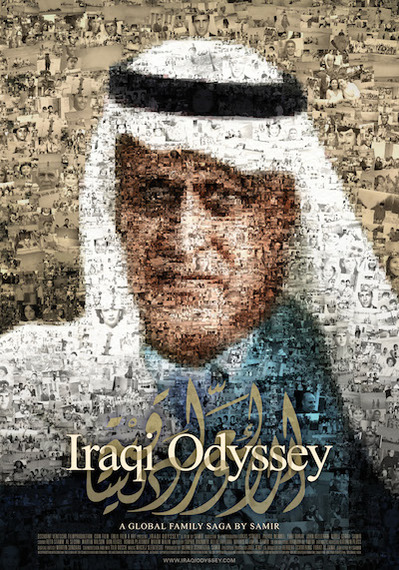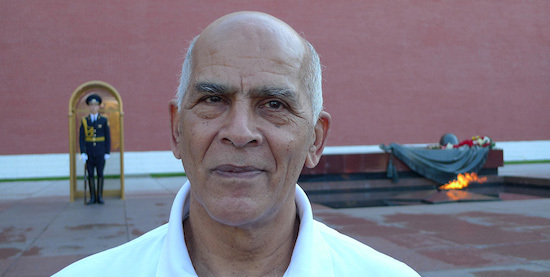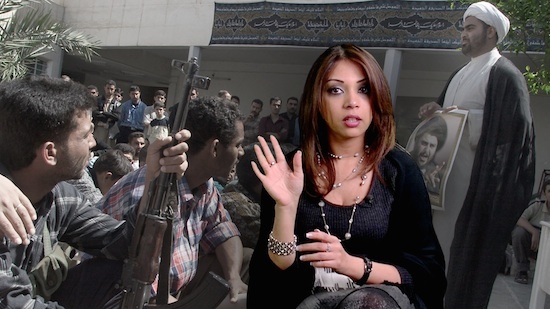 We're so used to hearing Iraq mentioned on the news and yet, I don't know about you but through the headlines, the violence, the dictators and the wars, I've actually learned very little about this historically rich country, and more importantly its resilient people -- the Iraqis. The medias always give us half the story anyway, and perhaps they too, while reporting on the state of affairs, are missing the bigger picture. I thought I was destined to be confused, especially now that ISIS has taken over that part of the world and the future for a modern, peaceful, prosperous Babylon looks bleaker than ever.
We're so used to hearing Iraq mentioned on the news and yet, I don't know about you but through the headlines, the violence, the dictators and the wars, I've actually learned very little about this historically rich country, and more importantly its resilient people -- the Iraqis. The medias always give us half the story anyway, and perhaps they too, while reporting on the state of affairs, are missing the bigger picture. I thought I was destined to be confused, especially now that ISIS has taken over that part of the world and the future for a modern, peaceful, prosperous Babylon looks bleaker than ever.
But then I watched Samir's Iraqi Odyssey -- or as I like to call it "Iraq Decoded" -- at the recent Abu Dhabi Film Festival. Iraqi Odyssey was funded in part by SANAD, the funding arm of ADFF and a wonderful support for films in and about the region.
The film is a nearly three-hour long 3D documentary, and I owe it to the honor of being part of the Netpac jury that I got to watch the film. In fact, when all was said and done, our jury president, Vietnamese master filmmaker Dang Nhat Minh, fellow jury member NYU Abu Dhabi professor Dale Hudson and I all unanimously agreed about Iraqi Odyssey winning this edition's Netpac Award. And trust me, we were not at a loss for beautiful films with the 18 titles we had to choose from!
Iraqi Odyssey went further, though. Samir's work is a personal, insightful and beautifully made film, a touching portrayal of the resilience of humanity and an ode to the power of holding on to one's culture, while also accepting each other. For the full two hours and 47 minutes I was spellbound in front of the screen, and I must have written twenty pages of notes. The history I never knew, the struggles I never imagined, the culture I was never familiar with, all weaved a portrait of Iraq, and its most honorable representatives the Iraqi people. A brilliant reference to all things great, the moments we'd all rather forget, and perhaps a roadmap to fixing the future of this country whose stability is so crucial to the balance of our entire world.
In Abu Dhabi, I sat down with filmmaker Samir, his producer Joel Jent, as well as two of the protagonists of this family-saga-slash-human-tale, Samir's half-sister Souhir and their uncle Jamal. They revealed even more family secrets and obstacles they've overcome, to get to this place that holds so much promise. It was a meeting I will never forget.
Your film is quite lengthy, for a documentary. Did you ever think of making it shorter?
 Samir: In the beginning we thought it would be around 100 to 110 minutes max, I was very much optimistic that I would only reach two hours. But then we had a huge problem. Any presentation to the Western public was followed by "Which war?" "What day?" "What year?" "Who was this?" and "Who belongs to whom?" And so I think after we had a rough cut which was really about two hours, after the gathering with the family, portrayed in the last scene, I had to sit down and get a kind of presentation of the whole history. And I reduced it really, really to the max.
Samir: In the beginning we thought it would be around 100 to 110 minutes max, I was very much optimistic that I would only reach two hours. But then we had a huge problem. Any presentation to the Western public was followed by "Which war?" "What day?" "What year?" "Who was this?" and "Who belongs to whom?" And so I think after we had a rough cut which was really about two hours, after the gathering with the family, portrayed in the last scene, I had to sit down and get a kind of presentation of the whole history. And I reduced it really, really to the max.
Joel: Don't forget that it's about 100 years of Iraqi history and you've seen the structure -- on the one hand you have the historical timeline and on the other you have the geographical movements by the protagonists in the film, and you have the protagonists. You have so many layers, the structure of the film is quite complex. When Samir tried it shorter, we had always some problem.
For me the sub-title for your film is "Iraq Decoded". I finally have a timeline, an understanding as a Westerner. Everything you go through is so complete and so complex, and then it has the human aspect. If I were to say what is a perfect documentary, yours is the perfect documentary. Even at 2 hours and 47 minutes long.
Samir: In the end it was very hard, the rest of my team pushing me to reduce to the max, so we had it, with the historical part, at 140 minutes. And then they came along with the question "And now, where are you? You can't tell the story of your family and you don't tell us anything about yourself." And they were right of course.
Souhir, what were some of the challenges that you had to overcome, in talking about your story?
Samir: They [Souhir and Jamal] had to overcome much more than I. Honestly.
Souhir: First of all, to talk to my brother, I didn't see him as a director, that was a hard part. I was talking like he knows everyone, he knows everything about my life so he was always telling me, "explain more!" I was talking to my brother and I forgot that he was a director, making a movie, I was telling him a story. So that was one of the problems. And of course, talking about yourself, putting your story in public, it's not easy.
Samir: Maybe you have to explain a little bit more. For a Western public they would say this is an ordinary girl, but honestly, she knew how she would behave in front of the camera and how every word would be scrutinized. She had to overcome much more than me, even the male part of the film.
Jamal: I think Souhir showed special bravery. It's hard for people in the West to understand, but look this film will definitely be seen by all members of our family. Now there are some female members who may agree with this, who may think she should have behaved differently, she should have dressed differently. You follow my meaning? But Souhir found it within herself to come out and say bravely what she thought and I think she's an essential part, especially because it is the younger generation. It is not us whose time has already passed, it's her time.
Personally, I related to Souhir instinctually, because she's a woman, she shows bravery, she's living in the US.
Jamal: I think that bravery of women runs in the family. My Mom was especially brave. She was not afraid to state her opinion in front of anybody. She studied abroad, and came back and started teaching in Iraq.
Samir: Not just teaching anywhere, she was teaching really in the "favela" of Baghdad, and there are a lot of stories about her. She went there to teach the kids. The poor kids. It was kind of like "You go to the gangland?" Like in Rio going into a favela. Somebody told me that when she went there all the other teachers were always waiting until she came, to enter the neighborhood.
Jamal: She was the eldest and the other teachers were much younger than her and my Mother was like me, dark-skinned, and she had an aquiline nose. She looked very much like an Indian so the kids in this "favela" used to clap their hands and say, "Here comes Indira Gandhi and her gang."
You were able to leave Iraq, but at what cost?
Souhir: As I said in the movie, there were a lot of moments I felt I lost my life. Because I graduated in 2004 as an engineer and I didn't feel the time. I spent ten years away now. But when I went to Baghdad again and I saw my colleagues, my friends, they have ten years' experience, they have families, they have kids... Wow, it's like I missed a whole life and it wasn't easy for them but for me it was harder, because I didn't have any other choice, and I was absolutely alone.
Samir: Some have criticized me by saying "Why are you showing only the good things?" Of your family. But then I really thought about it, it's true, I tried to show that you can overcome difficult times if you really, really try to reflect on your situation to overcome the oppression, to try to find new ways of thinking. As I told in the film, I tried to get Souhir into Switzerland, it was not possible, so she found a way to go alone to the US, which was not only a question of finding a way out of the trap, but also overcoming an idea. Because to go to the "enemy's land"? Should I go really to the enemy's land, it was also this question... Should I really go there? And I tried to show that in the film, this contradiction. You survive and you go somewhere you never dreamed about, because you were attacked by them. And you use this contradiction to overcome and to rebuild your own soul and your own capacity to survive.
Souhir: I will never forget this, the landlord of my apartment was so nice, he invited me, because he said "I don't want anyone to feel lonely for Christmas." So every holiday, because he knew I don't have any family there, I will never forget this. He was so nice to me. And there were a lot... As Samir said, when I was in Jordan, yeah is seemed "the enemy land." But when you are there you start to realize that there are good people, they are human beings just like us. But they have no idea what's going on in Iraq.
What do you want people to walk away with, when they watch Iraqi Odyssey?
Samir: I hope I have also shown that when I'm using the clichés, I'm showing that the stereotypes exist but there is always something behind the stereotype... You have to remain curious about the rest of the world. Try new things. Go new paths... Somebody asked me in one of the last screenings, "Why haven't you talked about ISIS, why not about the killings of the Yazidis and the Christians?" I said, first it's a movie, it's not a reportage, so I cannot react directly. But on the other end I can tell you, this film is much more a weapon against these insane ideologies because we are showing people, that even in a difficult world, and under difficult circumstances, you can try to really get new ways and to rethink your position instead of just following the stereotypes. Just think and be reasonable and use common sense. With common sense, a curious mind and a little courage to go new ways, you can't lose.
Images courtesy of the Abu Dhabi Film Festival, used with permission.


